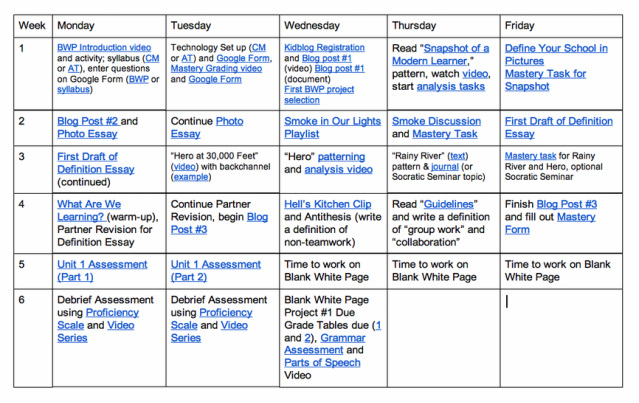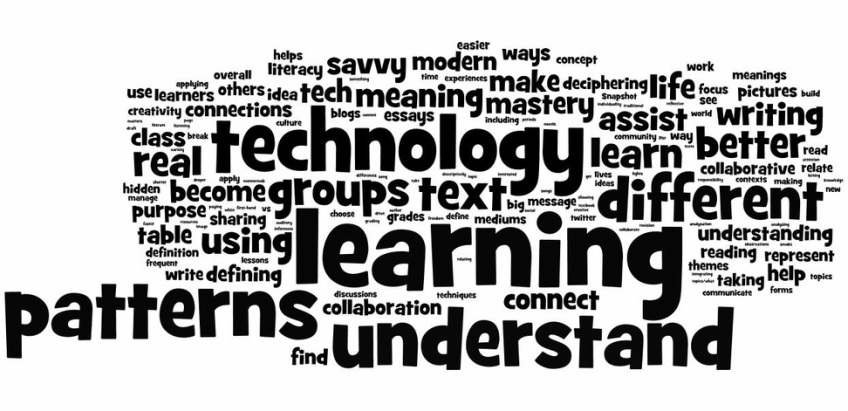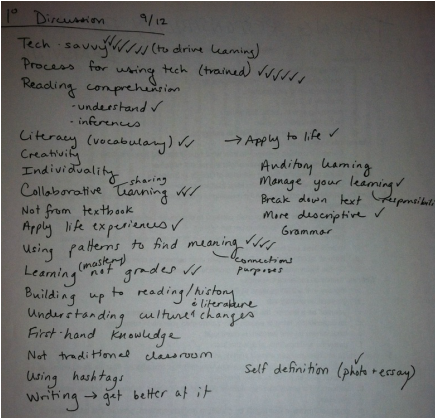One is to talk to people smarter than us. There's a great chance that some of that conversation will end up being in a video we can share publicly.
One was to start, or prepare to start, new units, none of which we had ready beyond a vague description and texts. The overwhelming nature of the number of preps we have that are totally brand new, along with the sheer number of students (I have 155! I've never had that many! I now know all their names...after six weeks!) means that grading and planning are really overwhelming. More on that in a bit.
But the Real Change needed to happen with us.
For Andrew, we instituted more structure. Instead of giving students self-paced work time, we put routines in place and drew it back to only semi-self-paced. The desk arrangement changed. The new unit was put on hold until we could make sure students had learned all the things they needed to learn in the first unit.
But my Special Skillz are in implementing routine, structure, lesson planning, and classroom management. So we worked to get those in place.
For my students, it was mostly about me and the personality I wasn't allowing to show in the classroom. I realised just how little the kids knew about me. That may not seem like a big deal, but in a flipped class built on collaboration, it was killing everything I was trying to do.
Just how much that was affecting my students became clear when I did a simple activity with them.
I wrote a short memoir this summer, and part of it was based on describing photographs in a way that built a narrative. So I pulled a piece of that as a model for an activity my Essay Ex class was doing. I didn't tell them it was mine at first. I was shaking I was so nervous about it. If it hadn't been for Andrew, I would have never shared it.
And they had nothing bad to say. They said it was beautifully written and the imagery was great, and that it showed depth of emotion. And I was scared to death to tell them it was mine. It felt...weird. When I told them it was mine, they were taken aback. I could tell that even that small thing raised my ethos as a writer, and made me a Real Person instead of a benevolent taskmaster. Several students, for the first time ever, stayed behind to talk to me after class and ask about the picture I had written about.
*****
For many reasons, sharing my personality with my students is not something I do much of anymore. Sure, I joke with them and show genuine interest in them and give them advice when they ask for it. But they don't know much about my personal life. I love them, and they like and respect me. But they don't know where I went to college, why there are posters and art from South Africa covering the walls of my room, or why I occasionally wear an migratory engagement ring on various fingers.
And that's not good enough.
That's not how I started my career. I'm not saying I told them everything in my personal life, but I did tell them stories, and shared my own hopes, dreams, aspirations, etc. with them.
And when that didn't go down well with certain people at my first school, I was forced to reevaluate how much I told students about myself; as a result, I retreated into a persona I didn't much like - a Sage on the Stage, who could answer any question...as long as it wasn't personal.
And now that I've reevaluated again, I can see just how much all of that was really hiding - people told me I was "too close" to my students and I was so afraid of that being true that I made it Not True.
I'm not saying that our job is to air our issues in front of our students (nothing bothers me as much as a teacher who forces their stories on bored kids who are pretending to listen intently so they can check Facebook instead of doing class), but they need to know us and invest in us personally.
One of the things I am most grateful to have learned from Andrew is that relationship is the centre of everything we do. Our work together is built on a solid foundation of friendship, and without that friendship, we wouldn't be attempting something as crazy as team-teaching from a continent apart. And one of Andrew's many Special Skillz is that relationship is the heart of his classroom. He is an amazing creator of classroom community. His students love him, and you can feel that in his classroom, even just through Google hangout. He makes them feel valued, cared about, and respected. And he doesn't do it by becoming their BFF or talking about his personal life ad nauseum.
He is just himself.
And his encouragement (both to share my writing with my students and in general) and friendship has taught me so much about how to build community in my flipped class. It's not the same as when I first started: at 21, I didn't know exactly what was over-sharing and what was under-sharing. I didn't know how to be myself and be their teacher. So I just stopped being myself just in case I accidentally "did it wrong."
And Andrew has taught me how to do it right.
And you know what? When I changed, my class changed.
Now, my students have always been intrinsically-motivated, high-achieving, genuinely fun kids. Which just proves how much I am the problem.
And here's the most amazing thing: I just so happened to find someone who had all the Special Skillz I lacked, and who lacked many of my Special Skillz. And we just so happened to both have the same educational goals. And we just so happened to decide to throw in our lots together before we knew just how much we needed each other to become better teachers and better people.
And we just so happened to start to model in our own lives exactly what we want for our students: a collegial partnership that gives you what you need, even when you didn't know you needed it. A collaborator who is good at everything you're not. A friend who is not scared to tell you the truth, even when you really don't want to hear it.
I had no idea how isolated and lonely teaching had been until it just wasn't anymore.
****
Now, I'm not saying we have things figured out. It's a long road, but I feel like we've finally stopped searching for the trail and have found purchase, not only on A trail, but on the RIGHT trail.
And we had some absolutely amazing days in class. Here's a brief description of what we're doing in each class, with some links. As always, take and use, but please credit Andrew and I if you do.
SAX Playlist
(that's what is sounds like when you say Essay Ex too many times, short for Essay Exposition)
Students read three atypical narratives: 1) How to Become a Writer (fiction), 2) Under Water (creative non-fiction), and 3) In the Ruins of the Future (expository). They found repeated words, which we developed into pattern groups, and used those to analyse the features of a narrative. They are now preparing for a seminar on the questions (available on the playlist in the documents that go with each text). Then they will look at some descriptive/observation narratives and do the same. It will culminate in them writing their own atypical narratives.
Language of Humour Playlist
We finished reading most of David Sedaris' book Me Talk Pretty One Day, and watching several episodes of South Park to determine how comedians take something that is Not Funny and turn it into Very Funny. We watched Monty Python's Search for the Holy Grail and blogged about how they used the toolkit we developed. Each class did an inquiry unit to figure out what made something funny. (3rd period 6th period)
Now, we're reading Hitchhiker's Guide to the Galaxy and comparing it to the Radio Drama to figure out how characters are created in different mediums. We will also read Good Country People and figure out how to create vivid, funny characters. They will end the unit by writing a narrative with vivid, funny characters, and will translate it into two different genres to show how genre shapes a text.
American Literature Playlist
We just started Their Eyes Were Watching God. A book I had never read before. Or taught. But that Andrew LOVES. So far, we have been focusing on two things: literal plot and the role of women in the novel. Andrew and I did our first close reading on video, where he talks intelligently and I smile and nod a lot. I love teaching this book because it's something that Andrew is genuinely passionate about and that came out in the video for sure.
I also have recorded myself reading (not that I'm great at it) so students can get used to the dialect used. All those videos are in the playlist. At the end of the unit, students will be analysing characters in the novel in a full-length literary analysis essay. We will also be doing a Socratic Seminar fairly soon to discuss the view on love and marriage and sex in the text,
If you made it this far, well done! I'm not sure how I end up writing so much every time, but there's just so much to talk about. I really, really love what I do.
Other cool stuff I'll write about eventually:
- all the guest blog posts we've written lately and have coming up
- visiting the Twitter HQ and working with a committee to help the local PBS affiliate come up with best practices for using technology in the classroom
- the webinar we're doing for Mentor Mob about collaboration
- the upcoming Flipped Class Open House
- presenting about Blank White Page at CVCUE with Karl Lindgren-Streicher and Andrew (Andrew virtually, of course)
- getting to go to NCTE's national conference in Vegas with 5 members of my department
- ideas for flipping novel units, now that we've actually started doing it
- profit?





 RSS Feed
RSS Feed
